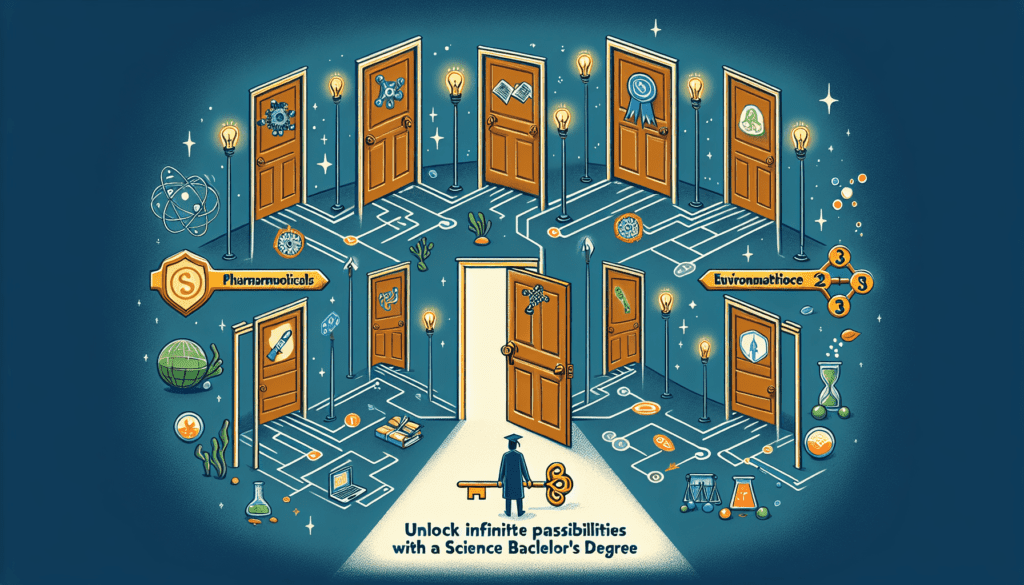With a science bachelor’s degree, the world of career opportunities opens up before you. From research and development to education and communication, the diverse range of fields that require a strong scientific background is vast. This article will explore and shed light on some of the highly sought-after jobs that you can pursue with a science bachelor’s degree, as well as the skills and qualifications that are often essential for success in these roles. Whether you aspire to be a biologist, environmental consultant, or data analyst, this article will provide valuable insights into the rewarding career paths that await you as a science graduate.

Research Scientist
Careers in academia
With a science bachelor’s degree, you have the opportunity to pursue a career as a research scientist in academia. In this role, you can work in universities, colleges, and research institutes, contributing to the advancement of scientific knowledge. As a research scientist in academia, you will have the opportunity to conduct independent research, secure grants and funding, publish your findings in scientific journals, and collaborate with colleagues on interdisciplinary projects. This career path allows you to delve deep into your area of expertise and make significant contributions to your field.
Government research positions
Another option for science graduates is to work in government research positions. Government agencies often have research departments dedicated to studying various scientific subjects, such as the environment, health, and technology. As a research scientist in a government agency, you will be responsible for conducting studies, collecting data, and analyzing information to inform public policy decisions. Your research can have a direct impact on shaping regulations, implementing new initiatives, or addressing societal issues. Government research positions offer stability, job security, and the chance to work on projects with a significant societal impact.
Private industry research positions
Science graduates also have the opportunity to work as research scientists within the private industry. Many industries, such as pharmaceuticals, biotechnology, and technology, rely heavily on scientific research and development to innovate and improve existing products or processes. As a research scientist in the private sector, you may be involved in developing new drugs, designing new technologies, or improving manufacturing processes. This career path often offers competitive salaries, access to state-of-the-art facilities, and opportunities for career growth within the industry. Private industry research positions can provide a dynamic and fast-paced work environment, with the potential to translate scientific discoveries into tangible products or services.
Environmental Scientist
Environmental consulting
A science bachelor’s degree can also lead to a career as an environmental scientist, particularly within the field of environmental consulting. Environmental consulting firms work with various clients, including government agencies, businesses, and individuals, to assess and mitigate environmental risks. As an environmental scientist in a consulting role, you will conduct environmental impact assessments, evaluate pollution levels, and develop strategies to minimize ecological harm. Additionally, you may provide guidance on sustainable practices and help clients comply with environmental regulations. This career path offers the opportunity to work on diverse projects, ranging from land remediation to renewable energy development.
Government agencies
Government agencies at the local, state, and federal levels also employ environmental scientists. In these roles, you will be responsible for monitoring and assessing the impact of human activities on the environment. Government agencies play a crucial role in developing and implementing environmental regulations, and as an environmental scientist within these organizations, you will contribute to the creation of policies that safeguard ecosystems, protect public health, and promote sustainability. Working in government agencies offers stability, benefits, and the chance to make a meaningful difference in environmental preservation and conservation.
Non-profit organizations
If you are passionate about environmental advocacy and conservation, a career as an environmental scientist within a non-profit organization may be the perfect fit for you. Non-profit organizations dedicated to environmental causes work towards protecting and preserving natural resources, educating the public, and advocating for sustainable practices. As an environmental scientist in a non-profit organization, you may be involved in conducting research, organizing community outreach programs, or collaborating with other stakeholders to develop conservation strategies. This career path allows you to combine your scientific expertise with your passion for environmental stewardship and activism.
Pharmaceutical Sales Representative
Sales and marketing
A science bachelor’s degree can also open doors to a career in pharmaceutical sales and marketing. As a pharmaceutical sales representative, your role will involve promoting and selling pharmaceutical products to healthcare professionals, such as doctors, pharmacists, and hospitals. Your scientific background will enable you to effectively communicate the benefits and mechanisms of action of various drugs to potential customers. You will work closely with physicians and healthcare providers to understand their needs and provide information on how your products can improve patient outcomes. This career path requires a combination of scientific knowledge, strong communication skills, and the ability to build relationships with healthcare professionals.
Promoting pharmaceutical products
In addition to sales, pharmaceutical sales representatives are also responsible for promoting pharmaceutical products to potential customers. This includes organizing and participating in conferences, seminars, and other educational events to showcase new medications, provide product information, and educate healthcare professionals on the latest advancements in the field. By staying up-to-date with scientific research and clinical trials, you will be able to position yourself as a trusted source of information and build credibility within the medical community. This career path offers attractive commission-based incentives, a flexible schedule, and the opportunity to have a direct impact on patient care.
Building relationships with healthcare professionals
One of the key aspects of being a successful pharmaceutical sales representative is the ability to build and maintain relationships with healthcare professionals. By establishing trust and rapport with physicians, specialists, and other key stakeholders, you can effectively promote your products and secure long-term partnerships. Building relationships includes regular visits to healthcare facilities, providing educational materials, answering questions, and addressing concerns. As a pharmaceutical sales representative, you will act as a liaison between healthcare professionals and your company, ensuring that the needs of both parties are met. This career path requires strong interpersonal skills, adaptability, and a thorough understanding of the pharmaceutical industry.
Quality Assurance Analyst
Quality control in manufacturing
A science bachelor’s degree can lead to a career as a quality assurance analyst, particularly within the manufacturing industry. Quality assurance analysts play a vital role in ensuring that products meet the required standards of safety, efficacy, and quality. In this role, you will develop, implement, and maintain quality control procedures and protocols to monitor the manufacturing process. By conducting inspections, performing tests, and analyzing data, you will identify any deviations or flaws in the production process and work towards resolving these issues. Quality control in manufacturing ensures that the final products meet customer expectations and comply with industry regulations.
Ensuring compliance with regulations
Compliance with regulations is a crucial aspect of any industry, and as a quality assurance analyst, you will play a key role in ensuring that manufacturing processes and products meet the required standards. You will stay up-to-date with industry regulations, guidelines, and best practices, and develop strategies to ensure compliance. This may involve conducting audits, reviewing documentation, and collaborating with cross-functional teams to address any compliance issues. By ensuring adherence to regulations, you contribute to the overall safety and integrity of the products manufactured.
Troubleshooting issues
As a quality assurance analyst, you will also be responsible for troubleshooting any issues that arise in the manufacturing process. This can involve investigating customer complaints, analyzing data, and conducting root cause analysis to identify the underlying causes of problems. By implementing corrective and preventive actions, you help prevent future issues and minimize the impact on customers and stakeholders. Troubleshooting requires excellent problem-solving skills, attention to detail, and the ability to work effectively within a team. This career path offers the opportunity to ensure the quality and reliability of products and contribute to the overall success of the organization.

Data Analyst
Data collection and interpretation
A science bachelor’s degree can pave the way for a career as a data analyst, providing you with the skills to collect, analyze, and interpret scientific data. As a data analyst, your role will involve gathering data from various sources, such as experiments, surveys, or databases, and organizing it in a format that can be easily analyzed. You will use statistical methods and software to identify trends, patterns, and correlations within the data, gaining insights that can drive decision-making and inform research or business strategies. Data collection and interpretation require strong analytical skills, attention to detail, and proficiency in statistical analysis tools.
Identifying patterns and trends
Data analysts are responsible for identifying patterns and trends within datasets, allowing organizations to gain valuable insights and make informed decisions. By applying statistical techniques and data visualization methods, you can uncover relationships and trends that may not be immediately apparent. These insights can help optimize processes, improve efficiency, and drive innovation. Identifying patterns and trends involves critical thinking, problem-solving, and an ability to communicate complex information in a clear and concise manner. This career path offers the opportunity to bridge the gap between raw data and actionable insights, contributing to the success of organizations across various industries.
Presenting findings to stakeholders
As a data analyst, one of your key responsibilities is to present your findings to stakeholders in a clear and compelling manner. This involves translating complex data into meaningful insights that can be easily understood by non-technical audiences. Effective data visualization, storytelling, and presentation skills are essential in communicating your findings and making data-driven recommendations. By presenting your findings to stakeholders, you facilitate informed decision-making, promote data literacy within organizations, and contribute to the overall success of projects or initiatives. This career path offers the opportunity to bridge the gap between technical expertise and business acumen.

